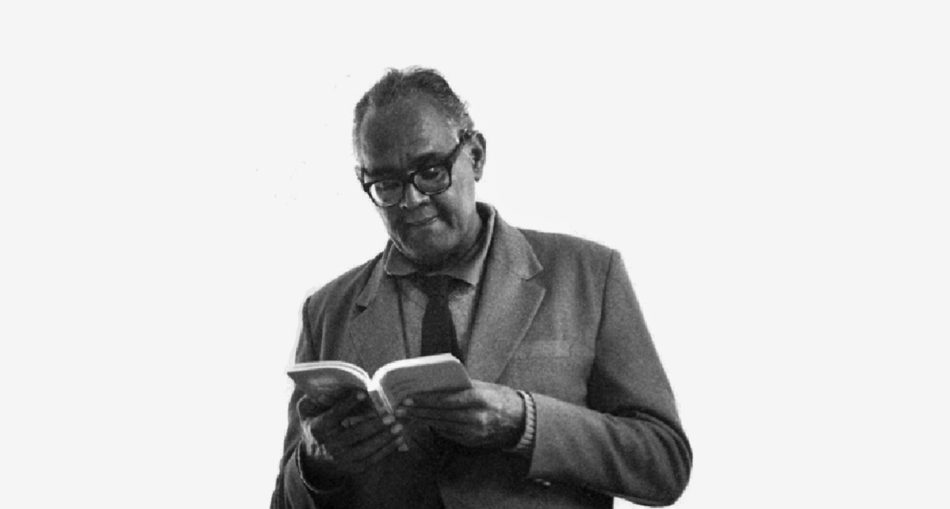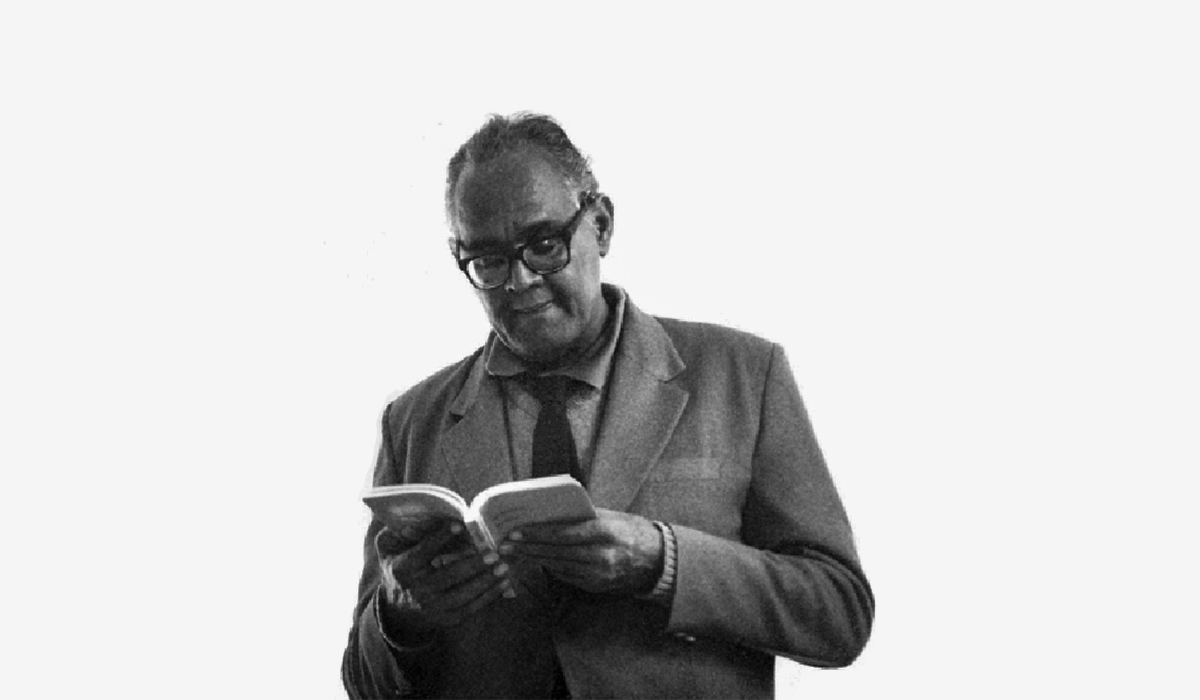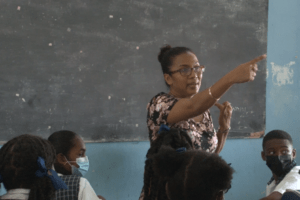Martin Wylde Carter was perhaps the most talented poet of his time and remains among Guyana’s revered. He is most famous for his poems of protest, revolution and resistance. Carter one of the first Caribbean poets to be published outside of the Caribbean. Carter’s involvement in politics inspired one of his most brilliant work “Poems of Resistance from British Guiana“. Like all poets, most of his work were inspired by his personal experiences. Martin Carter passed away on 9th December, 1997 leaving behind a legacy.
Early Life and Marriage
Martin Wylde Carter was born on 7th June, 1927 to parents Victor Emmanuel and Violet Eugene Carter (née Wylde). He was one of seven siblings. Even though his parents were of mixed African, European and Indian ethnicities they were fortunate to be middle class, thanks to his father, Victor’s civil service job. The love of poetry was ingrained into him at an early age. Victor and Violet were ardent readers and Carter fell in love with reading at first then writing his very own poetry as he aged. Little is known about his childhood and teenage years with the exception that he attended the Queen College school. Upon leaving high school Carter opted to join the civil service instead of pursuing tertiary education at a university. He worked for the Post Office and subsequently the Prison Service. In 1953, he wedded Phyllis Howard, a trained nurse who was also a close childhood friend. He was about twenty-six (26) years old and she was twenty-one (21). Keith Carter, their first child was born later in that very year. The marriage produced three more children. His second child, Sonia Carter was born shortly after his release in December 1954.
Political Career
Born in a colonial British Guiana, Carter was proactive in fighting for the independence of his country. He joined several political parties, after his country was free from the rule of the British, to continue the fight for his people. Martin’s political career began in1953, the same year of his wedding. He resigned from his job in the civil service and joined the People’s Progressive Party (PPP). The PPP took part and won the first universal suffrage elections ever held in British Guiana however Carter was not elected for any position. On 9th October, 1953 the British Guiana’s Governor declared a state of emergency in the country and Carter was arrested at a US airbase in Timehri. While he was detained without charge, they believed he was spreading dissension with the late Cheddi Jagan and Eusi Kwayana. In protest of this unjust imprisonment, he participated in a month-long hunger strike which started on 23rd November 1953, which was organized by the persons unlawfully detained. He was not released until January the next year under strict order not to leave Georgetown under which he remained until 1957.
Carter was once again arrested and imprisoned in June 1954 because he took part in a procession of People’s Progressive Party (PPP). He was released until December 1954. After this, he worked for a short while in British Council’s Georgetown Office as an information officer, then from 1959-1967 for the multinational Booker company. He resigned from his job as an Information Officer for Bookers when Guyana won independence in 1966 and joined the People’s National Congress. He was awarded a position as the Minister of Information and Culture in 1967.
Carter, troubled by the development of the PNC wanted no part in that and resigned from his position. He stated that he wanted no more part in governmental politics and wanted to “simply as a poet, remaining with the people”. He didn’t do this for a few more years since he went back to Booker from 1970-1978.
Always having the good of his country at heart, he took part in a demonstration in 1978 against the People’s National Congress, who were refusing to hold an election. As a result, he was badly beaten, thus sympathizing with Eusi Kwayana and Walter Rodney of the Working People’s Alliance.
After quitting his life of politics, the poet became the artist in residence at the University of Guyana in 1978, where he was also a lecturer in creative writing. His poetry collection Poems of Succession was written during this time and was published in 1977 by New Beacon Books.
Poetry
Most of Martin Carter’s written works revolved around the themes of resistance, revolution and protest, which were fuelled by his experience in politics. These garnered him fame many years after his death, in Guyana, the Caribbean and around the world.
Carter’s first poem was published under the pseudonym M. Black in 1950, in the People’s Progressive Party journal called Thunder. Other were featured in the Kyk-over-Al. The Hill of Fire Glows Red was his first short collection, published in 1951 which appeared in A.J. Seymour’s Miniature Poet Series. This collection was followed by The Kind Eagle (Poems of Prison) in 1952 and The Hidden Man (Other Poems of Prison) and Poems of Succession in 1977. Inspired by his time in prison, Carter then went on to produce the pieces which garnered him fame, created a worldwide reputation and making his name a local household name. This collection was named Poems of Resistance from British Guiana. It was published sometime in May 1954 by the Marxist publishing house Lawrence and Wishart in London, United Kingdom.
Here are some of his poems:
- On A Child Killed By A Motor Car
- Playing Militia
- Shines The Beauty Of My Darling
- For Angela Davis
- Not I With This Torn Shirt
- Bare Night Without Comfort
- University Of Hunger
- Do Not Stare At Me
- I Come From The Nigger Yard
- This Is The Dark Time, My Love
Martin Carter is perhaps most famous for the poem, This Is A Dark Time, My Love. You may recognize it from your time doing English Literature (English B) in high school.
This Is the Dark Time My Love
This is the dark time, my love,
All round the land brown beetles crawl about.
The shining sun is hidden in the sky
Red flowers bend their heads in awful sorrow.This is the dark time, my love,
It is the season of oppression, dark metal, and tears.
It is the festival of guns, the carnival of misery.
Everywhere the faces of men are strained and anxious.Who comes walking in the dark night time?
Whose boot of steel tramps down the slender grass?
It is the man of death, my love, the strange invader
Watching you sleep and aiming at your dream.By: Martin Carter
Throughout his lifetime, Martin Carter was awarded several prizes for his mastery in writing. These include the 1989 Guyana Prize for Literature, 1994 Order of Roraima for outstanding contribution to literature and the1996 Gabriela Mistral Inter-American Prize for Culture for contribution to literature.
About Martin Carter
Martin Carter is truly an inspiration to Guyanese whether you’re a writer or not. Not only in Guyana but he inspired persons in the Caribbean and around the world. He was passionate about his country and his poetry – both of which went hand in hand. Carter drew off his experience with the fight for Guyana’s independence and produced several masterpieces. He was an ardent poet, often getting up midnight to write even as he held onto his day jobs. It is said you could have found him scribbling on the insides of cigarette packs and almost anywhere else. His fame grew many years after his death, after which his wife, Phyllis continued to honour her husband’s work.
Article Reference
- https://en.wikipedia.org/wiki/Martin_Carter
- https://biography.jrank.org/pages/2449/Carter-Martin.html
- https://www.stabroeknews.com/2010/12/13/features/my-husband-who-is-a-poet/
- https://www.peepaltreepress.com/authors/martin-carter








